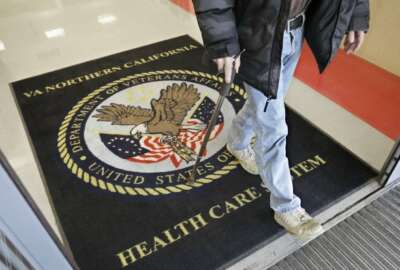
VA doctors can now treat patients in other states via telehealth
In today's Federal Newscast, a rule allowing Veterans Affairs providers to administer healthcare across state lines using virtual technology becomes finalized.
To listen to the Federal Newscast on your phone or mobile device, subscribe on PodcastOne or Apple Podcasts. The best listening experience on desktop can be found using Chrome, Firefox or Safari.
- A rule to allow Veterans Affairs Department providers to administer health care across state lines using virtual technology has been finalized. Licensing restrictions and state telehealth laws previously created some confusion for VA. It was unclear whether VA doctors licensed in specific locations could provide care to veterans in other states. VA’s new final rule overrides states laws, and lets the agency officially expand its telehealth program. VA also unveiled its new video conferencing app, VA Video Connect. (Department of Veterans Affairs)
- Federal websites could be getting an overhaul under a new bipartisan bill. The 21st Century Integrated Digital Experience (IDEA) Act would raise standards for dot-gov websites to make them more mobile-friendly. Reps. Ro Khanna (R-Calif.) and John Ratcliffe (R-Texas) introduced the bill. They said moving more government services online will cut costs. Recent data from the IRS showed online services cost the government a fraction of providing the same services in-person. (Rep. Ro Khanna)
- There could soon be a bug bounty program at the State Department. The Hack Your State Department Act cleared the House Foreign Affairs Committee. The legislation would allow white hat hackers to find cyber vulnerabilities within State’s networks. The White House’s IT modernization report recommended increasing the amount of bug bounty programs. (Rep. Ted Lieu)
- The Homeland Security Department may have to wait a little longer to permanently fill a key cyber position. Sen. Ron Wyden (D-Ore.) puts a hold on the nomination of Chris Krebs to be the undersecretary of Homeland Security for the National Protection and Programs Directorate. Wyden said the reason for the hold is DHS and Krebs need to be more open with the American people about the threat posed by cellular surveillance technology. Wyden is referring to the Stingray devices, which DHS said in April it found in use in the Washington, D.C. area. Krebs cleared the Senate Homeland Security and Governmental Affairs Committee on May 7. He has been performing the duties of the undersecretary since last fall. (Congress.gov)
- The Social Security Administration is moving ahead with plans to close two field offices next month. Field offices in Arlington, Virginia and Baltimore, Maryland are expected to close. The closures are continuing despite guidance in the 2018 omnibus that says SSA should wait to close more field offices until the agency’s inspector general finishes a review of the process it uses to consolidate offices. The IG previously looked at this issue back in 2015. It recommended five steps SSA should take to inform the public and employees about closures. (Federal News Radio)
- The U.S. Postal Service reported a $1.3 billion loss in the second quarter of 2018. That’s more than double the loss it reported for the same period last year. Despite the big loss, it reported $17.5 billion in total revenue for the quarter, a 1.4 percent increase compared to the same quarter last year. First-class and marketing mail revenue fell by $181 million this quarter. First-class mail is one of the Postal Service’s most profitable products. (Federal News Radio)
- The Homeland Security and Justice departments expanded their data sharing to catch companies who might be employing immigrants illegally. A new memorandum of understanding, specifically between U.S. Citizenship and Immigration Services, and Justice’s Civil Rights Division, is designed to find ways to more efficiently share information and swap referrals of cases. They’re looking for companies who misuse immigrants and non-immigrant visas to unlawfully discriminate against qualified U.S. workers. They’ve got 45 days to settle on types of data they’ll share. (U.S. Citizenship and Immigration Services)
- The Pentagon’s independent testing office said the Defense Department needs to fix problems with its new electronic health record system before it installs it at any more facilities. Based on tests at three of the first sites where MHS Genesis was first deployed last year, the office of Operational Test and Evaluation said the $4.3 billion electronic health record is not “operationally effective” and “not operationally suitable.” Defense officials said those results are based on tests conducted in 2017, and the system has improved since then. As of now, they don’t expect the necessary fixes to change the existing schedule for rolling out the EHR worldwide. The next round of installations is scheduled for next year. (Federal News Radio)
- The Air Force opened up its Kessel Run Experimentation Lab. The lab brings together airmen, civilians and contractors to build the next generation of combat software. The 90-seat office is located in Boston and helps with the upgrade and sustainment of the Air Operations Center. (Air Force)
Copyright © 2025 Federal News Network. All rights reserved. This website is not intended for users located within the European Economic Area.
Eric White
Eric White is news anchor and Federal Drive producer at Federal News Network.
Follow @FEDERALNEWSCAST
Related Stories





